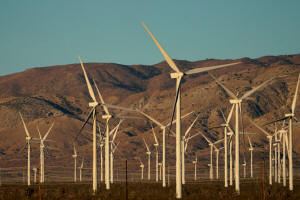Democrats in U.S. House introduce wide-ranging climate bill
 Send a link to a friend
Send a link to a friend
 [March 03, 2021]
By Timothy Gardner [March 03, 2021]
By Timothy Gardner
WASHINGTON (Reuters) - Three Democratic
lawmakers in the U.S. House of Representatives unveiled a wide-ranging
climate bill on Tuesday that embraces President Joe Biden's goals to
curb climate change including decarbonizing the electric grid by 2035.
Introduced by Representatives Frank Pallone, Paul Tonko and Bobby Rush,
and incorporating input from the Biden administration, the bill includes
a federal clean electricity standard requiring a percentage of retail
power sales to come from sources that produce little or no carbon
emissions.
The Climate Leadership and Environmental Action for our Nation's Future
Act, or CLEAN, requires 80% clean electricity by 2030 and 100% by 2035.

The power could come from sources including wind, solar and existing
nuclear energy. That could provide a boost to nuclear power, an industry
experiencing shutdowns amid low prices for natural gas, a competing
fuel.
The bill also sets a goal of a fully decarbonized economy by 2050.
On transportation, the largest source of carbon emissions, the bill
authorizes $100 million annually from fiscal 2022 to 2031 for entities
that install publicly accessible electric vehicle (EV) supply equipment.
It also requires the energy secretary to establish a program to help
determine where EV charging stations are needed and expands EV access in
disadvantaged communities.
The legislation, which needs to pass committees and then the full House
and Senate and be signed by Biden before becoming law, does not include
a carbon tax, a mechanism supported by some Republicans and companies.
[to top of second column]
|

A wind farm is shown in Movave, California, U.S., November 8, 2019.
REUTERS/Mike Blake/

"The votes are just not there for a price on carbon," also known as
a carbon tax, Pallone told reporters. He said a carbon price had
concerns from an environmental justice perspective because it could
allow industries to keep polluting as long as they buy permits from
entities that have cut emissions elsewhere.
"It's time to try something new," Pallone said, noting that carbon
tax plans failed in Congress most recently in 2009/2010. Tonko, who
prefers a carbon tax, called a clean energy standard "achievable."
Three Republican representatives, including David McKinley from
coal-producing West Virginia, said the bill's mandates would raise
energy prices and make the country more reliant on Chinese critical
mineral supplies.
They want policies to "capture all the advantages of our abundant
resources, which include coal, hydropower, nuclear technologies, and
clean natural gas."
Another climate bill from McKinley, and Representative Kurt
Schrader, a Democrat, includes a less ambitious goal of requiring
utilities to cut emissions 80% by 2050. Pallone said his bill could
be adjusted to draw Republican support.
Given the thinnest possible Democratic majority in the Senate,
Pallone suggested that senators could try to pass the bill under
budget reconciliation in that chamber. That process requires only 51
votes instead of 60 in the 100-member Senate.
(Reporting by Timothy Gardner; Editing by Peter Cooney)
[© 2021 Thomson Reuters. All rights
reserved.] Copyright 2021 Reuters. All rights reserved. This material may not be published,
broadcast, rewritten or redistributed.
Thompson Reuters is solely responsible for this content. |